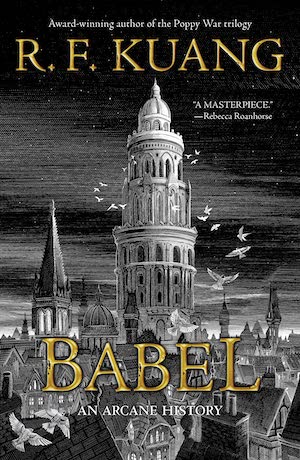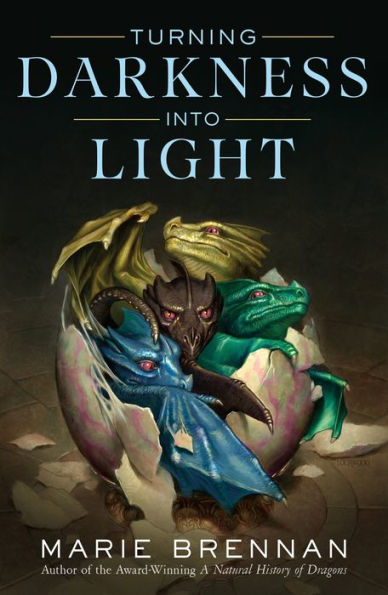Languages give us greater access to people and knowledge, and the more of them we know, the more power they give us by expanding that access. Knowledge of languages also determines which ones survive, which ones are lost, and which ones dominate over the rest. Everything we do today, from obtaining an education in a coloniser’s language to resisting (or working with) AI, centres around the undeniable potency of languages.
How do SFF authors visualise the role of such power? Here are five takes on what it means to translate, to preserve languages, and to use language for preservation…
Babel, or the Necessity of Violence by R.F. Kuang

Perhaps no list of SFF about translation would now be complete without Kuang’s powerful speculative exploration of the role of language in the British Empire’s growth, with the translation gap acting as a literal source of magic that powers the economy of the colonialists.
From the outside, the Royal Institute of Translation—or Babel—is a haven for linguists and translators. Robin, an orphan from China, is trained by Professor Lovell to study at the Institute, for there is power in speaking a tongue one knows since birth, as opposed to learning it at a later age. Multilingual people, Robin learns, are a resource the empire uses to expand its reach. As he meets other students who have similarly been brought to Babel for their diverse and “exotic” mother tongues, Robin finds himself questioning the role of his language in enabling colonisation. What can a powerless student from a colony do to fight the empire? Can words—language—actually make a difference?
Turning Darkness Into Light by Marie Brennan

Audrey Camherst, the granddaughter of the pioneering dragon naturalist Isabella Camherst, wants to live up to her family name through her work on decoding and translating a set of Draconian texts, which she is working on with her close friend and colleague, Kudshayn, who has his own battles to fight with society. The project is not just a scholarly undertaking—as the duo uncover the meaning of the text, they find that there are people who don’t want the translation completed, and who are willing to do anything to twist the text for their own ends.
A standalone sequel to Brennan’s wonderful Lady Trent memoirs, this book marvellously combines linguistics, archaeology, folklore, and politics, and makes me wish, every time I think about it, that I’d discovered sooner that one could make a career in languages and translation.
“Diamonds and Pearls” by JL George
When you speak the common tongue, diamonds fall from your mouth. When you use the Old Tongue, which was once forbidden and is now largely forgotten, you get pearls. Osman knows only swear words in this vanishing language, but he speaks them still so that he can collect the pearls—one for each new word he learns. It is his little rebellion, in which he is joined by another, a partner not just in love but also in language preservation. But love, like language, is never static. Can the Old Tongue be enough in keeping a relationship intact, or will the affection slowly disappear just like the language did?
“The Lexicographer and One Tree Island” by Akhim Alexis
Accompanied by a corbeaux that brings him news from other places, Tonie spends his time on the single mango tree on a tiny island, a very small part of what used to be the Caribbean island of Gahara. He doesn’t want the Gahara language to disappear, so he spends part of his day writing down in his notebook every word he can remember, leading the corbeaux to name him a lexicographer.
When one day there’s news of other human survivors, including one who speaks Tonie’s tongue, Tonie has to decide—should he leave One Tree Island to join them, or should he stay here, potentially losing the chance to connect with someone who can help him preserve his language?
“A Pale Horse” by M Evan MacGriogair
The world is going to end. Our protagonist watches the horizon over the waves, looking for something, though she’s not sure what, as she thinks about the silences in the world, the fire alight in the Amazon, the species going extinct. As she heads home, she spots a car window with a phrase scribbled across it, reading “seeking a friend for the end of the world,” along with words from a language she was just thinking about. She writes back with her number and receives a sound file, a piece of music that seems to reflect a deep understanding of what she’s been looking for. In return, she sends the stranger a video of the view from her window.
So begins an exchange in recording and sharing the beauty of the world. It’s a beauty that infuses pictures and music and language, connecting people without needing meaning, offering a way to preserve the world, its sights, its music, its languages. I have read many short stories about both beauty and the end of the world, but I have never read something so deeply immersive, so gentle, so optimistic, something whose prose has the feeling of gauzy curtains in the summer or a hazy winter’s walk. Beautiful.











Perhaps tangential but the first thing that I thought of was “The Gostak and the Doshes”: https://en.wikisource.org/wiki/Avon_Fantasy_Reader/Issue_10/The_Gostak_and_the_Doshes
H. Beam Piper’s “Omnilingual” is a classic look at problems of translation. It does sport possibly the least-inspiring final line of any story I’ve read.
The first book that came to mind when I saw the topic was Snow Crash…
See also “That Share of Glory” by C.M. Kornbluth, first published in Astounding in January 1952, about The College and Order of Heralds, a quasi-monastic brotherhood devoted to learning the languages of the galaxy, who are hired by interstellar traders as translators, The fact that their ur-text is Machiavelli’s “The Prince,” gives away what their ulterior motives may be.
Lexicon by Max Barry
Two more:
China Mieville’s ‘Embassytown’
Ann Leckie ‘Teanskation State’
Janet Kagan’s Hellspark also fits
Couple of classics immediately sprang to mind: Samuel R. Delany’s Babel-17 and Jack Vance’s The Languages of Pao.
What about Foreigner? Bren Cameron, the main character of the entire series, is literally a translator. It’s a whole series that elevates and focuses on the power of language.
It also never fails note to Bren’s alienation from his birth species and the difficulties in humans and ateivi relations.
C.J. Cherryh’s Foreigner series, with translator Bren Cameron as main character; and also her older Chanur series (whose one human character is never the viewpoint character, so that we see him only through nonhuman eyes).
I highly recommend La Vita Nostra. It’s a mind-bendingly weird dark academia novel set in Russia written by the Russian authors Marina and Sergey Dyachenko. Language and translation are a key component of this book. The English translation is excellent.
Any more traditional fantasy, less mind-bendy but still fun, is Dave Duncan’s A Man of His Word series, where the magic system is based on capturing specific words.
Babel 17
Alphabet of Thorn by Patricia McKillip.
The Color of Distance by Amy Thomson (first contact, stranded human, mysterious visual language that appears on the locals’ skin but involves both communication and internal emotional state).
Also, haven’t yet read Battle of the Linguist Mages by Scotto Moore yet, but I need to!
Not written translation but Drunk on All Your Strange New Words by Eddie Robson has a human translator/interpreter for an alien dignitary as the main character. The alien language is telepathic and causes an effect similar to inebriation the longer the conversation continues.
Others have beaten me to my first thought, Babel-17, but I’m surprised no one has yet mentioned Ted Chiang’s “The Story of Your Life.”
Gotta have Ray Nayler’s *The Mountain in the Sea* on this list!
A Memory Called Empire by Arkady Martine centers upon a translator and the cultural understandings that underpin a language. Heady stuff and brilliantly portrayed.
I’d also add Native Tongue (the first book, but also its successors) by Suzette Haden Elgin, looking at (among other issues, including patriarchal power structures) whether it is ethical to use babies as language learners for alien languages.
IT’S A COOKBOOK!
Story of your life by Ted Chiang.
Why no mention of C.J Cherryh? I mean, MOST of her Sci-fi books involve translation of some sort! More, they involve humans learning to adapt to alien concepts as well. Hunter of Worlds would be a good book to start with, and the Faded Sun trilogy a really decent read too, before proceeding on to the Chanur books, and the Foreigner series.
A short story whose title escapes me hinges on the fundamental misunderstanding of a field xenologist who thinks she is witnessing a ritual of euphemistic rebirth when she is really, really not. She is also an egoist who commissioned a clone-daughter, who she keeps beside her at all times, in order to continue her work. The consequences are dire. The last scene is simply a repetition of the ceremonial words the aliens use at the close of the ritual–except that what just happened makes their meaning clear in a fundamental way.
I like–not sure what to call it–the literary trick of feigning translation in order to point up the absurdity or otherwise of something. Such as:
China Miéville’s Embassytown deserves a mention. Some of these books depend on the validity of the Sapir-Whorf hypothesis, which is likely dubious.
After all, several languages, unlike English, don’t have gendered pronouns. This doesn’t seem to be related to sexism or antipathy to trans people.